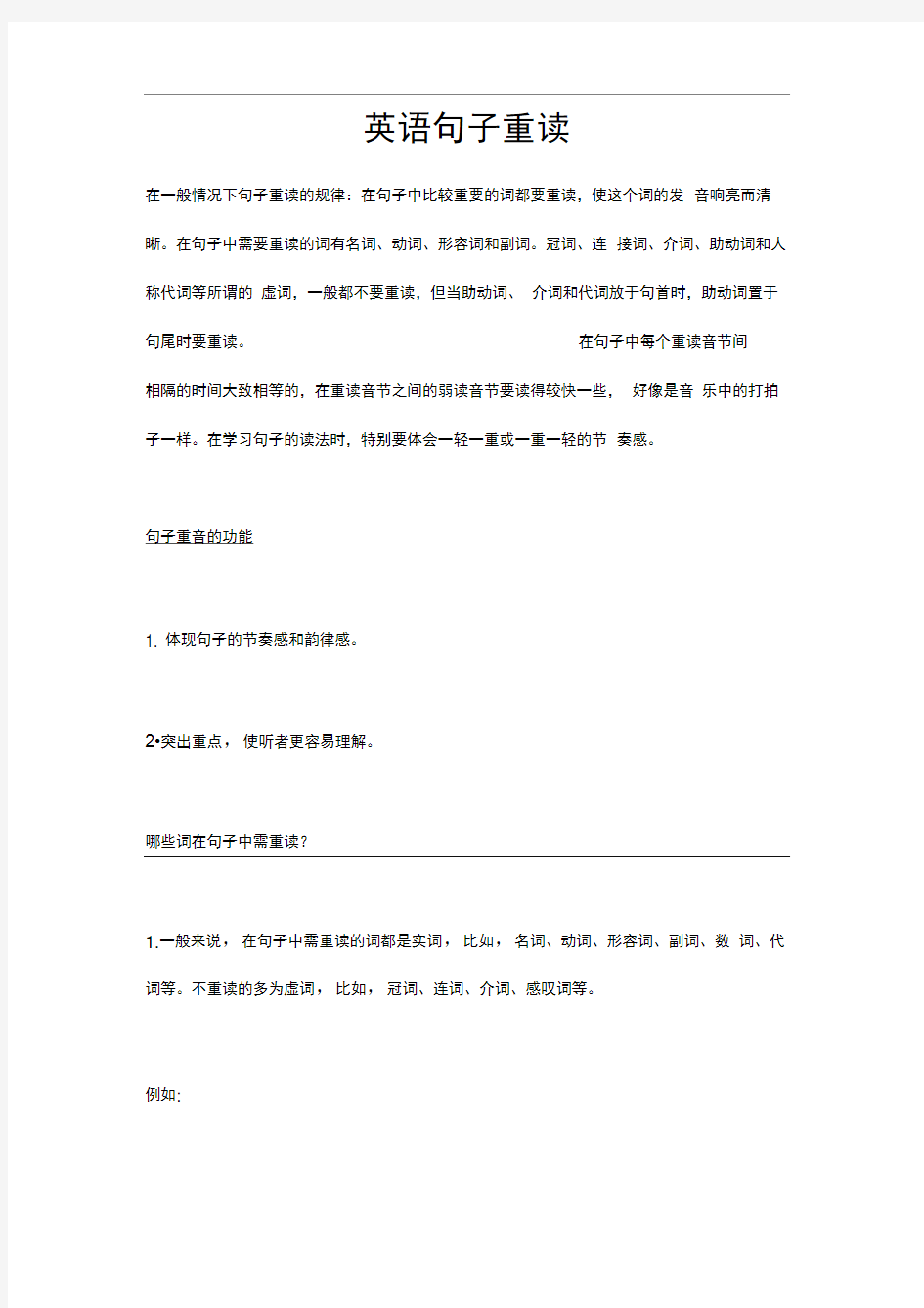英语句子重读(转载)


英语句子重读
在一般情况下句子重读的规律:在句子中比较重要的词都要重读,使这个词的发音响亮而清晰。在句子中需要重读的词有名词、动词、形容词和副词。冠词、连接词、介词、助动词和人称代词等所谓的虚词,一般都不要重读,但当助动词、介词和代词放于句首时,助动词置于句尾时要重读。在句子中每个重读音节间
相隔的时间大致相等的,在重读音节之间的弱读音节要读得较快一些,好像是音乐中的打拍子一样。在学习句子的读法时,特别要体会一轻一重或一重一轻的节奏感。
句子重音的功能
1. 体现句子的节奏感和韵律感。
2?突出重点,使听者更容易理解。
哪些词在句子中需重读?
1.一般来说,在句子中需重读的词都是实词,比如,名词、动词、形容词、副词、数词、代词等。不重读的多为虚词,比如,冠词、连词、介词、感叹词等。
例如:
The streets are wide and clean. (这句话中的streets 是名词,wide 和clean 是形容词,它们都要重读;the, are, and 不重读。)
I am so glad to see you again. (这句话中的so, glad, see, again 要重读, 而I, am, to, you 不重读。)
2. 有时候虚词也要重读,以下几点需注意:
1)强调或突出某个虚词或be 动词时,应将其重读。例如:
We saw him playing by the river.(这句话中的we 和him 一般不重读,但为了
表示强调也可以重读。比如,如果we 重读,则强调是#我们#而不是别人看见。)
2)介词在句首时往往要重读。例如:
On my way to school, my bike was broken. (这句话中的on 在句首应重读。)
3)be 动词及助动词和not 结合时要重读。例如:I]m sorry I can]t do that. (这句话中的can]t 要重读。)
Didn]t I tell you yesterday? (这句话中的didn]t 要重读。)
4)句子末尾的be 动词和助动词一般要重读。例如:
-Are you a student? -Yes, I am. (这里的am 要重读。)
注意:上文刚出现过的并且重读的单词,第二次提到时一般不再重读?如:
-How many boys are there in the room? -There are twenty boys in it. (问句中的boys 要重读,但答语中的boys 不重读。)
英语句子的语调一般都是由高到底(或由低到高,再由高到底),一个音节一个音节顺次向下降。语调或升或降,或高或低,一般都落在短语或句子的最后一个重音上。
如:What time can I see \ (降)you? Do you mind if I smoke /(升)?
降调的特点:
如果句子的第一个音节是重读音节的话,那么第一个音节最高,然后顺此向下降,
最后一个重读音节用降调。如:'Mother has 'gone to 'town \ (降).
如果是以非重读音节开始的话,那么开始的非重读音节很低,句子中的第一个重
读音节最高,然后顺次向下降,最后一个重读音节用降调。如:
I shall 'call you to'morrow 'morning \ (降)
降调的用法:
降调用于:陈述句、特殊疑问句、祈使句(表示命令)、惊叹句。
升调:
升调的特点:
如果句子的第一个音节是重读音节的话,那么第一个音节最高,然后顺此向下降,最后一个重读或非重读音节用升调。如:
'Have you been 'staying here 'long /(升)?
如果是以非重读音节开始的话,那么开始的非重读音节很低,句子中的第一个重读音节最高,然后顺次向下降,最后一个重读或非重读音节用升调。
如:Is he 'coming to'morrow 'morning /(升)?
升调的用法:
升调一般用于一般疑问句、祈使句(表示委婉、客气)、陈述句(含有感情色彩
时,如不肯定、疑问、安慰、不耐烦等)。
语调群:
每一个短语、从句或句子为一个语调群。一个句子可能包含有几个语调群
1.升调在前,降调在后类型的句子:
1)选择疑问句:Do you prefer tea /(升)or coffee \ (降)?
2)以状语或状语从句开始的句子:At ten o'clock in the morning
(升)the con test bega n \ (降).
3)计数或点东西:One /(升),two /(升),three /(升)and four (降).
2.降调在前,升调在后类型的句子:
1)反意疑问句:You went to the concert yesterday \ (降),did n't you (升)?
2)前面是陈述句,后面有一表示不肯定或疑虑的附加语。It's going to rain (降),I'm afraid /(升).
3.前面是降调,后面也是降调的句子:
1)反意疑问句(不表示疑问):It is a fine day \ (降),is n't it ?(降)\
2)主句在前,状语或状语从句在后的陈述句。He will know better when he gets older \ (降).
3)并列句:The telephone rang, but I didn't answer it.
Practice:
1. You don't smoke, do you?
2. I won't go if it rains.
3. Do you prefer to take a walk or stay at home?
4. There are plates, bowls, cups, knives and forks on the table.
5. When and where shall we meet again?
6. We've had a very enjoyable evening, haven't we?
7. Don't shout at me.
---I'm not shouting at you.
Who's shouting at you?
Nobody's shouting at you.
You're being silly.
8. Nancy's going to be twenty-one next month.
---Nancy? Twenty-one? I thought she was much older.
I went to her birthday party last week.
---Did you? I thought you were out of town.
9. You're not being fair.
---You mean me? Not fair?
You're talking just like your mother.
---Talking like my mother? I am not.
